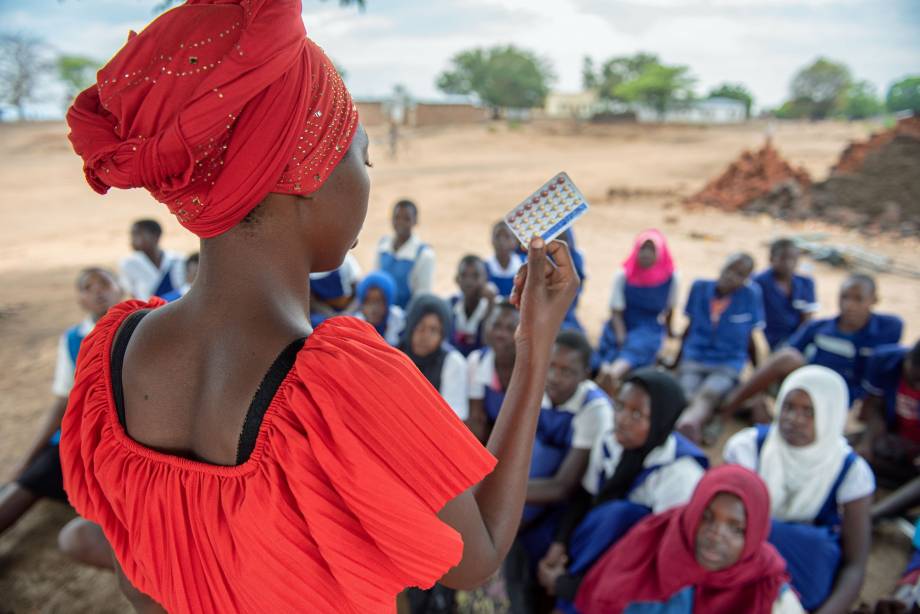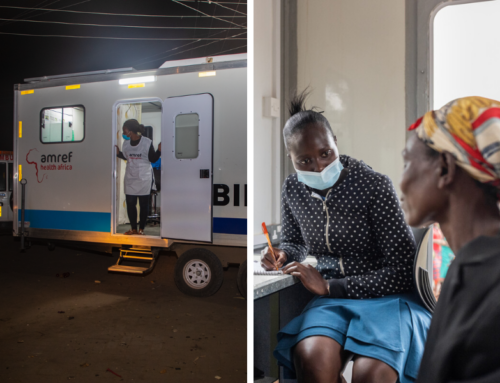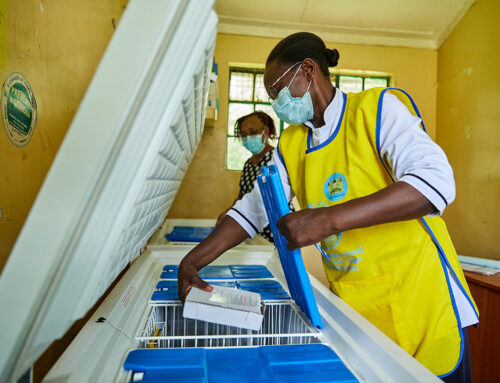
Family planning, or contraception, is one of the most revolutionizing interventions for women and girls, though often not given the attention and priority it deserves. It is a useful tool to reduce maternal deaths particularly among adolescents and youth (Ahmed et al., 2012). Contraception is an excellent way of avoiding unplanned pregnancies and its many consequences thus supporting girls to remain in school. By staying in school, girls improve their chances of economic and social empowerment that not only benefits them but translates to enhanced quality of life for the family and community at large (Chandra-Mouli et al., 2014; Nove et al., 2014).
Health systems, particularly in sub-Saharan Africa where Amref Health Africa is based and carries out health-focused programming, continue to struggle – overburdened by many diseases and shortage of resources. By investing in family planning, millions of dollars are saved through a reduction in births and associated complications which can be diverted to other urgent and critical needs, including improving provision of primary health care services (Frost, Sonfield, Zolna & Finer, 2014).
The COVID-19 pandemic has put unprecedented stress on the health system, including redirecting of funds from family planning and primary health care needs and thus negatively affecting the provision of services. Therefore, more investment is needed by stakeholders to protect the vulnerable from the ill effects of both the pandemic, and its secondary consequences.
Despite the transforming power of family planning, girls and women continue to struggle with limited knowledge to support them to make an informed choice on contraception (Kissoon, Dugani, & Bhutta, 2015). Informed choice, however, requires more than knowledge; services must be available, accessible, acceptable, and affordable with the right method mix to ensure the needs of clients are met. Unfortunately, services in many sub-Saharan countries have not met these essential characteristics thus threatening the realization of family planning benefits for many. There is an urgent need, therefore, to avail resources to bridge the gaps. Informed choice for family planning is not only a pillar for quality health but is a human right (Hardee et al., 2014; Woog et al., 2015).
World Conception Day: September 26, 2020
World Contraception Day has been celebrated every 26th day of September since 2007 to improve awareness of family planning to support young people to make informed choices (WHO, 2018). In Kenya, this year’s theme focusses on ‘Sustaining Family Planning Services during the COVID-19 Pandemic while marching towards Sustainable Domestic Financing for Family Planning”. All stakeholders must work towards overcoming additional barriers resulting from the COVID-19 pandemic while creating a resilient system for sustainability beyond the pandemic. In Uganda, the theme for this year is “Roll Back the Teenage Pregnancy Crisis in Uganda. Make SRH Services, Information, and Rights Accessible to All”.
Amref Health Africa is committed to transforming lives, particularly of the most vulnerable, such as teenage girls, to enhance lasting health change in Africa. Amref works with stakeholders to support responsive family planning services, particularly for adolescents and youth. Appropriate family planning for these groups of people enhances not only their current health but contributes towards improving their future health and economic prospects throughout their life cycle.
Our Work in Family Planning
People’s interaction with health workers can promote or discourage the uptake of family planning; hence, it is critical to ensure health workers have the right skills, favourable attitude, and the right environment, including infrastructure and supplies. Amref advocates for and supports quality family planning services by building the capacity of health workers in technical and managerial skills using traditional methods as well as innovative approaches through technology, such as our mobile and eLearning platforms. Essential equipment and supplies are provided to enhance the environment of care.
However, it is no use having quality services without demand for those services. Amref works with communities, mainly through community health workers, to empower them with the right information to support informed choices. Amref has deployed innovative models, including the use of mobile phones and social-media, to reach youth with accurate information on family planning. Advocacy and holding duty bearers, such as local governments, accountable is also a vital component of our work.
Zambia
In Zambia, with funding from the Netherlands government through the Health Systems Advocacy Partnerships project, Amref has advocated for increased local financing for family planning and has built the capacity of community-based organizations in advocacy to create a robust civil society that will contribute to the achievement of sexual and reproductive health and rights (SRHR). Amref has also supported advocacy around the NHIF Act (National Hospital Insurance) and lobbied for its passage into law, which has a component on family planning. Amref has supported budget tracking at the local government level in Ndola and Kitwe districts in Zambia to develop an evidence base for investment in family planning.
South Sudan
In South Sudan, Amref has trained community mobilizers in Wau. They join in youth activities, such as sports, games and other social events, to share family planning information including where services are available. Over the years, many Boma Health Workers (the name for community health workers in South Sudan) and community-based distributors have been trained and supported to serve the communities. To further enhance access to contraception, this year Amref trained 108 health workers in 42 private health facilities on rights-based family planning and will support them to design a social franchising program.
Ethiopia
In Ethiopia, Amref, in close collaboration with and guidance from the Ministry of Health’s maternal and child health directorate and funding from the David and Lucile Packard Foundation, has introduced quality family planning services at the health post level. Since 2015, this project has impacted 200 health posts in Jimma and East Wollega Zone of the Oromia region. For effective community engagement, an innovative community feedback mechanism was introduced. Using a waterproof three colour-coded card (green, yellow and red) the community provides feedback on their level of satisfaction with family planning access and services. Literate and illiterate clients are able to provide feedback using the scorecard. The health facility and district health office uses the feedback for continuous quality improvement. Amref is sharing and advocating to scale up this best practice by various stakeholders, including the national government.
Kenya
In Kenya, no region is being left behind in our family planning work – from the coast (Mombasa and Kwale) to the lake region (Homa Bay), to Northern Kenya (Marsabit, Samburu and Turkana). Through the Foreign Commonwealth Development Office (UK AID) funded project, ‘Delivering Sustainable and Equitable Increases in Family Planning (DESIP)’, meaningful community dialogues are driving out the ingrained myths and misconceptions on family planning, and couple’s counselling is ongoing to ensure active participation from male partners in family planning use. Through community health volunteers, community leaders, male champions and youth peers, all ages in communities are being reached appropriately. Using a health systems strengthening approach, Amref is the lead partner supporting the public sector to ensure that quality family planning services are provided in an equitable manner. Through these efforts, the DESIP project has supported community engagement to ensure that girls, women and men make informed decisions on family planning.
Uganda
In Uganda, Amref has been at the forefront of advocating for and ensuring access to and availability of quality family planning services, with a focus on vulnerable and young people with low parity. Under the Health Systems Advocacy Partnerships project, Amref has collaborated with several stakeholders to advocate for increased financing for human resources, sexual and reproductive health commodities (including family planning supplies) and improved stewardship (improved capacity of health workers and their government). In partnership with John Snow Incorporated, with funding from USAID, Amref has enhanced access to family planning services for the youth and rural population
Tanzania
In Tanzania, the Uzazi Uzima (Kiswahili for “Safe Deliveries”) project, with funding from the Government of Canada through Global Affairs Canada, has trained health care workers on youth friendly services, including family planning, to enable adolescent girls, boys and women to access quality services. Through the Health Systems Advocacy Partnerships project, with funding from the Netherlands government, Amref has advocated successfully for increased budget allocation for family planning in three district councils in Shinyanga region, resulting in a two- to three-fold increase in the budget for family planning. Community-based organizations have been trained in advocacy for sustained impact.
COVID-19
These different measures have proven to be critical in supporting health systems for resilience in the wake of the COVID-19 pandemic.
Throughout the Amref countries of operations we are working closely with a wide range of stakeholders to enhance the provision of responsive family planning services during the COVID-19 pandemic. Through participation in various committees at national and sub-national levels, provision of supplies and equipment, such as personal protective equipment, and joining hands in advocacy, meaningful involvement in combating COVID-19 has been realized.
Across Africa, Amref sits in strategic decision-making positons, such as task forces and technical working groups, both at the national and regional level in the different countries where we operate.
Amref pledges to continue working with governments and stakeholders to ensure young people and other vulnerable members of society have family planning information, counselling and access to services to enable them to make informed choices. Amref will continue working through its expansive networks to reach the community, health workers and policymakers.
Call to Action
Amref Health Africa on this day wishes to reiterate the call to:
-
All stakeholders to join hands in providing appropriate contraception information, counselling and access to quality services responsively with due consideration of the COVID-19 pandemic. This calls for innovative and adaptive measures in response to the different phases of the pandemic, and the different target groups and their specific needs.
-
Governments:
-
To support all stakeholders by continually reviewing and disseminating policies to ensure they are responsive to the situation on the ground during the COVID-19 pandemic and beyond.
-
To avail the necessary funds and use the available resources responsibly to ensure every woman and young person is reached and supported to make informed choices for family planning, by ensuring a conducive, non-judgmental and supportive environment.
-
In particular, we do wish to reiterate the call to institutionalize the community health workers into the public health workforce given the critical role they play in empowering the communities not only in family planning but in all matters related to health
-
We call upon donors to increase funding for family planning to address the adverse effects on services caused by the COVID-19 pandemic which threaten to reverse the gains made over the past decades towards the realization of universal access of sexual and reproductive health and family planning services.
-
We also call for robust research by educational institutions and organizations to continually research family planning service provision during emerging pandemics and emerging issues
Photo by: Jeroen van Loon
References
Ahmed, S., Li, Q., Liu, L., & Tsui A.O. (2012). Maternal deaths averted by contraceptive use: An analysis of 172 countries. Lancet; 380(9837):111-25. ttp://dx.doi.org/10.1016/S0140-6736(12)60478-4
Chandra-Mouli, V., McCarraher, D. R., Phillips, S. J., Williamson, N. E., & Hainsworth, G. (2014). Contraception for adolescents in low and middle income countries: Needs, barriers, and access. Reproductive Health, 11(1), 1. https://doi.org/10.1186/1742-4755-11-1
Frost, J., Sonfield, A., Zolna R.M., & Finer, L. (Dec, 2014). Return on Investment: A Fuller Assessment of the Benefits and Cost Savings of the US Publicly Funded Family Planning Program. The Milbank Quarterly. 92(4):696-749.
Hardee, K., Harris, S., Rodriguez, M., Kumar, J., Bakamjian, L., Newman, K., & Brown, W. (2014). Achieving the Goal of the London Summit on Family Planning By Adhering to Voluntary, Rights-Based Family Planning: What Can We Learn from Past Experiences with Coercion? International Perspectives on Sexual and Reproductive Health, 40(04), 206–214. https://doi.org/10.1363/4020614
Kissoon, N., Dugani, S., & Bhutta, Z. A. (2015). Maternal and child health: Gains, but a long journey ahead. Canadian Medical Association Journal, 187(16), E471–E472. https://doi.org/10.1503/cmaj.150725
Nove, A., Matthews, Z., Neal, S., & Camacho, A. V. (2014). Maternal mortality in adolescents compared with women of other ages: Evidence from 144 countries. The Lancet Global Health, 2(3), e155–e164. https://doi.org/10.1016/S2214-109X(13)70179-7
World Health Organization (2018). Promoting health through the life-course. Available at https://www.who.int/life-course/news/events/world-contraception-day-2018/en/
Woog, V., Singh, S., Browne, A., & Philbin, J. (2015). Adolescent Women’s Need for and Use of Sexual and Reproductive Health Services in Developing Countries. 63.




